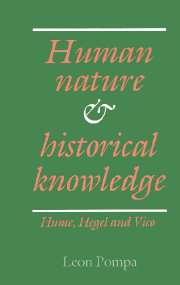4 - HISTORICAL CONSCIOUSNESS AND HISTORICAL KNOWLEDGE
Published online by Cambridge University Press: 31 October 2009
Summary
In the foregoing chapters it has been argued that, despite the many differences between them, Hume, Hegel and Vico shared the belief that knowledge of human history presupposes a theory of human nature or of the development of human nature. According to Hume, knowledge of human history is impossible unless it presupposes the constancy of human nature or of human consciousness and is grounded upon an experimental knowledge of the latter. The advantage of this view is that, since it is the presupposition of constancy throughout time which is claimed, knowledge of the specific constants is theoretically available at any historical time. The disadvantage, however, is that, in virtue of this very feature, it rules out a priori the possibility of knowledge of any societies which do not share at least a consciousness which is akin, if not identical, to that of the historian's own society and, hence, makes it theoretically impossible to admit the possibility of any fundamental changes or developments in human nature or understanding. In rejecting this, it has not been claimed that we should be committed a priori to the existence of the latter, but only that we should not be excluded from it.
Hegel, on the other hand, while agreeing that there is a problem about the presuppositions of historical knowledge, is explicitly opposed to the uniformity of nature thesis. In part this opposition derives from his claim that human nature can be understood only in so far as one recognises that it exists in an internal relation to forms of social consciousness.
- Type
- Chapter
- Information
- Human Nature and Historical KnowledgeHume, Hegel and Vico, pp. 192 - 226Publisher: Cambridge University PressPrint publication year: 1990
- 1
- Cited by

